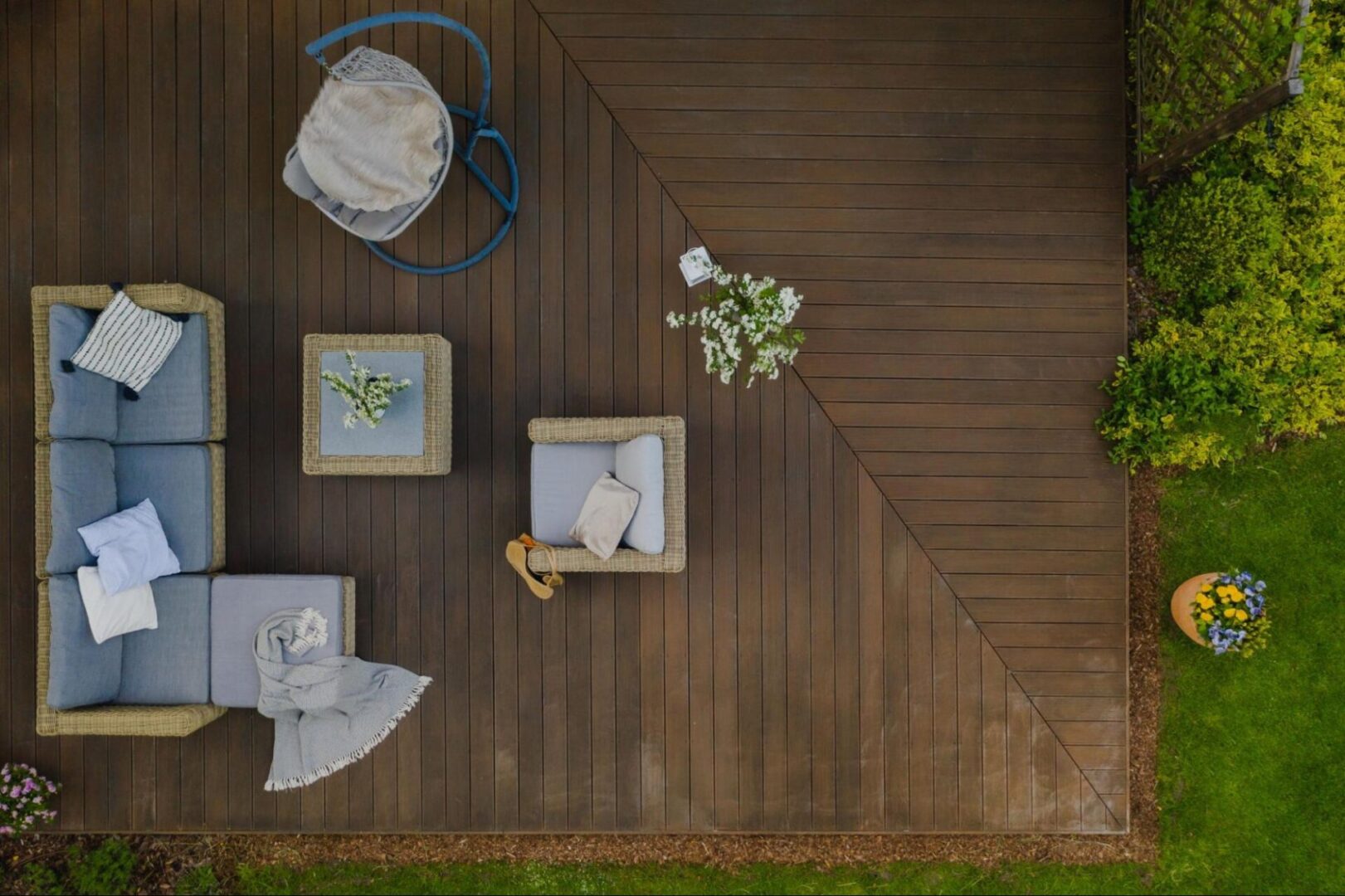
Building a composite deck offers durability, low maintenance, and aesthetic appeal, making it a sought-after choice for outdoor living spaces. As you plan your decking project, assessing the costs involved, from material selection to installation expenses, is essential. Composite decks are known for their long-term value, but careful budgeting ensures the project stays on track financially. By exploring all cost considerations, homeowners can make informed decisions to achieve the perfect balance of quality and affordability.
What Makes a Composite Deck Stand Out
Composite decks have become increasingly popular among homeowners due to their durability, aesthetic appeal, and low-maintenance nature. As outdoor living spaces remain a top priority in home improvement projects, composite decks provide a modern solution that enhances functionality and style. The ability to withstand harsh weather conditions while maintaining their appearance makes them a preferred choice for many. These decks have quickly become a staple in creating beautiful, lasting outdoor spaces.
Durability and Longevity
Composite decks are known for their exceptional durability, resisting rot, warping, and insect damage. Made from recycled wood fibers and plastic, the material withstands extreme temperatures and heavy foot traffic without deteriorating. Unlike traditional wood, composite decking does not splinter, crack, or fade over time, ensuring long-lasting performance. This durability makes it an ideal option for homeowners seeking a hassle-free and reliable outdoor solution.
Low-Maintenance Requirements
Composite decks require minimal upkeep, making them attractive for busy homeowners. Cleaning involves a simple wash with soap and water, eliminating the need for staining or sealing. The material’s resistance to mold, mildew, and stains ensures it looks fresh with little effort. This convenience allows homeowners to enjoy their outdoor spaces without dedicating excessive time to maintenance.
Aesthetic Versatility
Composite decks come in various colors, textures, and finishes, allowing homeowners to customize their outdoor space to match their preferences. The material mimics the appearance of natural wood while offering options for unique patterns and designs. A composite deck can complement any architectural style, adding visual appeal to modern and traditional homes. Its versatility ensures every homeowner can create a personalized and stylish outdoor retreat.
Eco-Friendly Composition
Composite decking is an environmentally friendly choice, often made from recycled materials such as wood fibers and plastics. By repurposing waste products, the manufacturing process reduces environmental impact compared to traditional wood decking. Many brands focus on sustainable practices, offering an eco-conscious option for homeowners. Choosing a composite deck contributes to a greener planet while delivering high-quality performance.
Resistance to Harsh Weather
Composite decks are built to endure extreme weather conditions, making them suitable for various climates. Rain, snow, or intense sunlight does not compromise the material’s integrity or appearance. The surface remains slip-resistant and safe, even in wet conditions, providing peace of mind for families. This resistance ensures the deck retains its beauty and functionality throughout the year.
Value Addition to Property
A composite deck enhances a property’s value by combining functionality, durability, and visual appeal. Potential buyers see it as a low-maintenance feature that adds to the home’s usability and charm. The long-lasting nature of composite decking ensures it remains an asset for years, making it a valuable investment. Adding this type of deck increases the home’s marketability and gives homeowners a solid return on investment.
Factors Influencing Composite Deck Costs
The cost of building a composite deck varies depending on several factors, making it essential for homeowners to evaluate their options before starting the project. Composite decking materials are known for their durability and low maintenance, but the final cost depends on decisions made during the design and construction. Elements such as material choice, deck size, and additional features all contribute to the overall expense. A clear understanding of these factors allows homeowners to plan their budgets effectively while achieving the deck of their dreams.
Material Selection
The type of composite material chosen significantly impacts the overall cost of the deck. High-end composite boards often feature enhanced fade resistance, scratch protection, and a natural wood-like appearance. Budget-friendly options are available but may lack some advanced qualities in premium materials. The choice between capped and uncapped composite boards also affects pricing, as capped boards offer better durability and protection. Homeowners should weigh their priorities to select a material that balances quality and affordability.
Size of the Deck
The size of the composite deck is one of the primary factors affecting the project’s cost. Larger decks require more materials, increasing both material and labor expenses. The shape and layout also play a role, as complex designs involve additional time and precision during construction. A larger surface area means additional framing, fasteners, and foundation work, all of which add to the total cost. Homeowners can optimize the size to fit their outdoor space and budget while meeting functional needs.
Design Complexity
The complexity of the deck design influences the cost due to the additional labor and materials required. Multi-level decks with curves and intricate patterns require skilled craftsmanship and more construction time. Custom features like built-in seating, unique railings, and integrated lighting increase expenses. A more straightforward design may be more cost-effective, but creative layouts can enhance the deck’s overall appeal. Selecting a design that aligns with aesthetic goals and budget constraints is key to managing costs.
Labor Costs
Labor expenses vary based on the deck’s design, size, and local market rates for professional installers. Decks with straightforward layouts are typically quicker to install, lowering labor costs. Complex designs with unique features require more expertise, resulting in higher charges. Hiring experienced contractors ensures the deck is built safely and efficiently, reducing the risk of costly mistakes. Comparing quotes from multiple professionals allows homeowners to find a skilled team within their budget.
Additional Features
Features such as railings, stairs, and built-in storage add functionality and style but contribute to the overall cost. Advanced features like lighting systems, pergolas, or privacy screens provide additional benefits but come with a higher price tag. Homeowners often include these upgrades to personalize their decks and create a more enjoyable outdoor space. Each feature adds value but should be carefully considered to avoid exceeding the budget. Prioritizing essential elements ensures the deck meets practical and aesthetic needs.
Permits and Local Regulations
Permit requirements and local regulations may add to the project’s overall cost. Fees vary depending on the location, deck size, and scope of construction. Homeowners must ensure the deck complies with building codes, which may involve inspections and adjustments during the project. Professional contractors often handle the permit process, which simplifies compliance but may increase labor costs. Factoring these expenses into the budget ensures a smooth construction process without unexpected delays.

Estimated Cost of Building a Composite Deck
Now that the factors influencing composite deck costs are clear, estimating the overall expense is more manageable. Composite decking projects typically involve a combination of material, labor, and additional feature costs. While the exact price depends on specific choices, knowing average estimates helps homeowners plan their budgets effectively. These cost ranges provide a clearer picture of what to expect when building a composite deck.
Cost of Composite Deck Materials
Composite decking materials range from $8 to $16 per square foot, depending on the quality and brand. Premium options with added features like scratch resistance and fade protection fall on the higher end of the spectrum. Budget-friendly options may lack advanced features but offer durability and low maintenance, making them suitable for cost-conscious homeowners.
Labor Costs
Professional installation costs typically range from $10 to $20 per square foot, influenced by the complexity of the project and local market rates. Simple designs are quicker to install and fall within the lower end of the range, while multi-level or curved decks require more time and expertise. Investing in skilled labor ensures the deck is built safely and efficiently, avoiding costly mistakes in the future.
Additional Features and Customizations
Depending on the scope of customization, adding features such as railings, lighting, or built-in seating can cost an additional $1,000 to $5,000 or more. These upgrades enhance the deck’s functionality and aesthetic appeal but require careful budgeting to avoid overspending. Prioritizing essential features ensures a balance between improving the deck and staying within budget.
Permit and Compliance Costs
Permit fees typically range from $100 to $500, varying based on location and project size. Some municipalities require inspections and additional compliance steps, which may increase the overall cost. Working with contractors familiar with local regulations simplifies the process and ensures all necessary permits are obtained.

Managing the Budget for Building a Composite Deck
Managing the budget for building a composite deck involves thoughtful planning and prioritizing essential aspects of the project. Focusing on simple designs, comparing material options, and strategically choosing features ensures costs remain controlled. Taking proactive steps, like scheduling off-season construction and monitoring the project closely, helps homeowners achieve a durable and stylish composite deck without overspending. A well-managed budget ensures the perfect balance of affordability and quality for your outdoor space.
Visit our Minnesota’s 1st Choice Replacement Windows and Doors blog today to explore expert tips and solutions for your home improvement needs.

